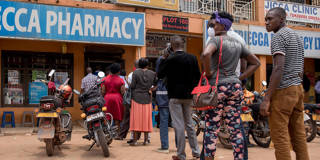WASHINGTON, DC – La pandemia de coronavirus no pudo llegar en peor momento para África. Pese a las mejoras en gestión macroeconómica de la última década, el continente todavía carece de recursos para afrontar altos niveles de pobreza y desigualdad, crear empleo en el sector formal y fomentar las transformaciones estructurales necesarias para incorporar a 12 millones de jóvenes por año al mercado laboral. Y ahora la COVID‑19 amenaza con dar un duro golpe a la economía africana.
El bajo promedio de crecimiento anual del continente (3,3% en 2014‑19) se debió ante todo a estrategias de desarrollo erróneas que se centraron en industrias inviables con uso intensivo de capital (a menudo en commodities) en vez de promover sectores competitivos con uso intensivo de mano de obra. A su vez, la falta de crecimiento suficiente limitó los recursos fiscales, y eso llevó a subfinanciación de los sistemas sanitarios, mala gobernanza, veloz aumento de la deuda pública y grandes déficits de infraestructura.
En vista de la precariedad de las instituciones sanitarias africanas y la escasez de médicos, trabajadores sanitarios, fármacos y suministros médicos, es probable que las infecciones por COVID‑19 se multipliquen y se genere una crisis humanitaria (que casi seguramente no será debidamente registrada). El virus puede proliferar en áreas pobres sin conexión a las redes de agua potable y saneamiento y en comunidades donde los bajos niveles educativos, los hábitos sociales predominantes y la desconfianza hacia el gobierno complican los esfuerzos de contención. Si no se dispone pronto de una cura para la COVID‑19, la pandemia puede devastar África.



WASHINGTON, DC – La pandemia de coronavirus no pudo llegar en peor momento para África. Pese a las mejoras en gestión macroeconómica de la última década, el continente todavía carece de recursos para afrontar altos niveles de pobreza y desigualdad, crear empleo en el sector formal y fomentar las transformaciones estructurales necesarias para incorporar a 12 millones de jóvenes por año al mercado laboral. Y ahora la COVID‑19 amenaza con dar un duro golpe a la economía africana.
El bajo promedio de crecimiento anual del continente (3,3% en 2014‑19) se debió ante todo a estrategias de desarrollo erróneas que se centraron en industrias inviables con uso intensivo de capital (a menudo en commodities) en vez de promover sectores competitivos con uso intensivo de mano de obra. A su vez, la falta de crecimiento suficiente limitó los recursos fiscales, y eso llevó a subfinanciación de los sistemas sanitarios, mala gobernanza, veloz aumento de la deuda pública y grandes déficits de infraestructura.
En vista de la precariedad de las instituciones sanitarias africanas y la escasez de médicos, trabajadores sanitarios, fármacos y suministros médicos, es probable que las infecciones por COVID‑19 se multipliquen y se genere una crisis humanitaria (que casi seguramente no será debidamente registrada). El virus puede proliferar en áreas pobres sin conexión a las redes de agua potable y saneamiento y en comunidades donde los bajos niveles educativos, los hábitos sociales predominantes y la desconfianza hacia el gobierno complican los esfuerzos de contención. Si no se dispone pronto de una cura para la COVID‑19, la pandemia puede devastar África.